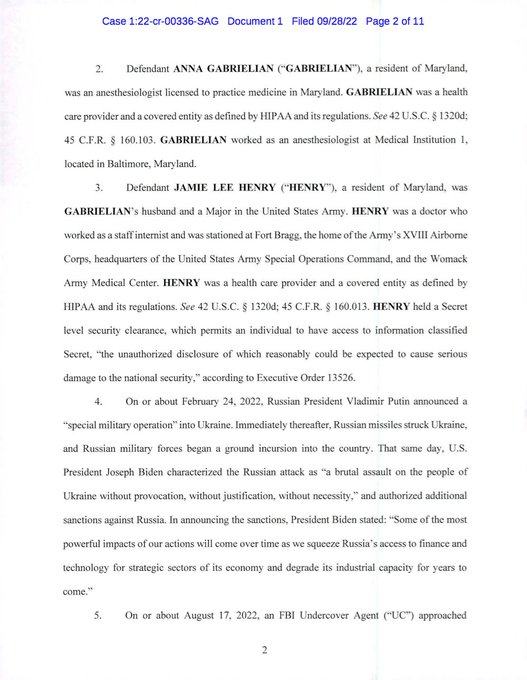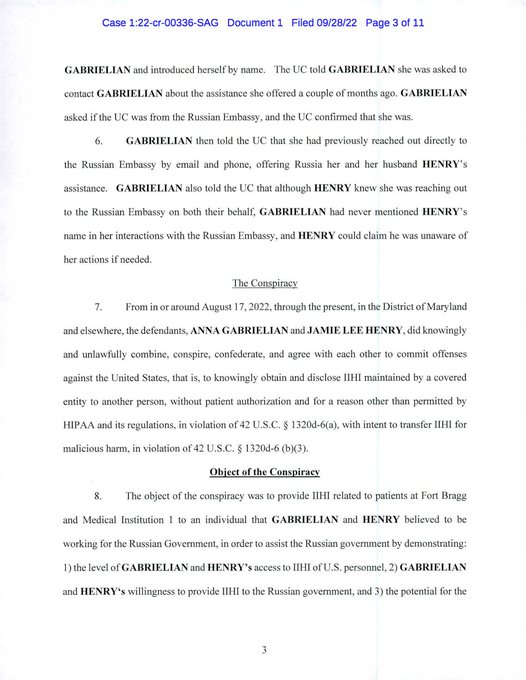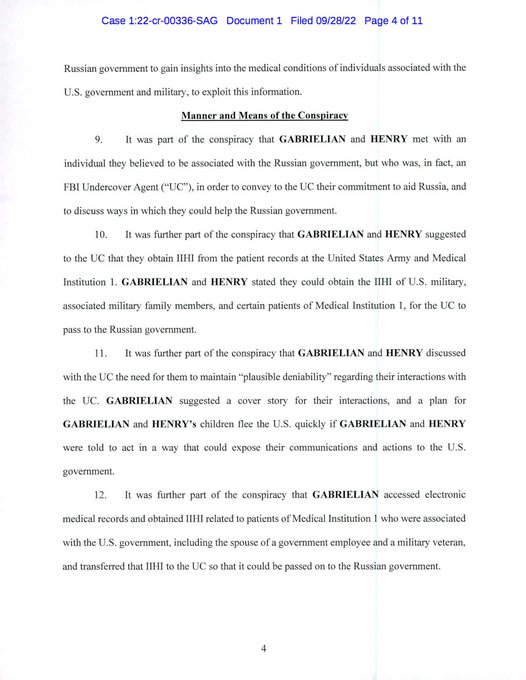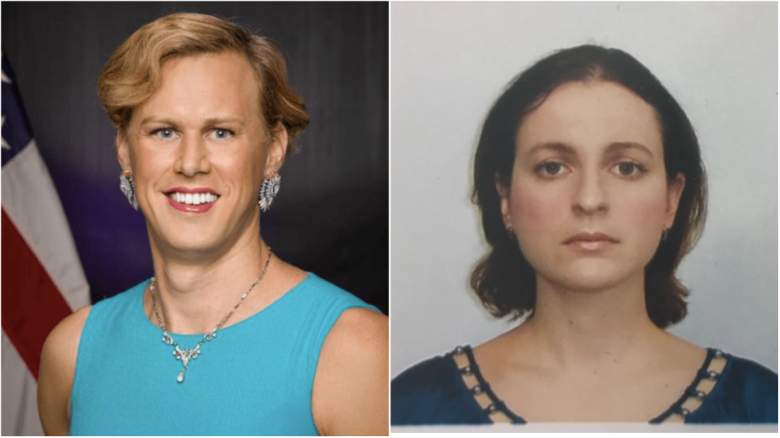
US Army/LinkedIn Major Jamie Lee Henry, left, and Dr. Anna Gabrielian.
Dr. Anna Gabrielian is a Johns Hopkins Hospital anesthesiologist accused along with her U.S. Army doctor spouse, Major Jamie Lee Henry, in a plot to provide soldiers’ medical info to Russia, federal authorities say. Gabrielian and Henry were indicted on September 28, 2022, in Maryland federal court on charges of conspiracy and wrongful disclosure of individually identifiable health information (IIHI), according to court documents obtained by Heavy.
According to the indictment, Henry worked as a staff internist at Fort Bragg in North Carolina and had secret security clearance. Gabrielian works in anestheiology and critical care medicine at Johns Hopkins Hospital in Baltimore and has also specialized in obstretic anesthesiology, according to her biography on the hospital’s website, which notes she speaks Russian and English. They live in Rockville, Maryland, according to prosecutors. Both Henry and Gabrielian, who have been married since 2015, are in custody, authorities said.
Gabrielian, 36, believed she was providing medical information on U.S. service members to a person working at the Russian embassy, prosecutors said in the indictment. But that person was really an undercover FBI agent who met with her in August and asked Gabrielian about assistance she had offered to the Russian embassy earlier in the year, according to the indictment.
Henry, 39, previously made headlines in 2015 by becoming the first active U.S. Army officer to come out as transgender. The indictment refers to Henry as Gabrielian’s husband and uses he/him pronouns, but in a 2015 article by BuzzFeed News, Henry used she/her pronouns and identified as a woman. It was not immediately known if Henry and Gabrielian have hired attorneys who could comment on their behalf.
According to a press release from the Department of Justice, Gabrielian was scheduled to make her first appearance in court in Baltimore on September 29, while Henry’s first court appearance hasn’t been set. “The indictment was announced by United States Attorney for the District of Maryland Erek L. Barron and Special Agent in Charge Thomas J. Sobocinski of the Federal Bureau of Investigation, Baltimore Field Office,” the DOJ said.
“If convicted, the defendants face a maximum sentence of five years in federal prison for the conspiracy, and a maximum of 10 years in federal prison for each count of disclosing IIHI. Actual sentences for federal crimes are typically less than the maximum penalties. A federal district court judge will determine any sentence after taking into account the U.S. Sentencing Guidelines and other statutory factors,” the DOJ said its press release.
Here’s what you need to know about Anna Gabrielian and Jamie Lee Henry:
1. Gabrielian Told the FBI Agent She Would ‘Provide Any Assistance She Could to Russia, Even If It Meant Being Fired or Going to Jail,’ the Indictment Says

GettyAnna Gabrielian works at Johns Hopkins.
According to the indictment, an undercover FBI agent approached Gabrielian on August 17, 2022, and told her “she was asked to contact” her “about the assistance she offered a couple months ago.” Gabrelian then asked the undercover agent if she was from the Russian embassy and the agent said she was, prosecutors said. Gabrielian told the agent she had reached out to the embassy by phone and email “offering Russia” her and her spouse’s assistance, according to the indictment. Gabrelian told the agent she was reaching out on behalf of her and Henry, but never mentioned Henry’s name in interactions with the Russian Embassy so Henry could pretend to be unaware of her actions if needed, according to the indictment.
Gabrelian and Henry conspired to provide private health information of Fort Bragg and Johns Hopkins patients to the Russian government to demonstrate their access to that information on U.S. military and government personnel, their willingness to provide that information to Russia and the “potential for the Russian government to gain insights into the medical conditions of individuals associated with the U.S. government and military, to exploit this information,” according to the indictment.
According to prosecutors, Gabrielian and Henry met with the undercover FBI agent, who they believed to be working for the Russian government, together, “to discuss ways in which they could help” Russia. The couple suggested they could obtain patient records for U.S. military members and family members to pass to the Russian government, prosecutors said.
Gabrielian told the agent during an August 17 meeting she was “motivated by patriotism toward Russian” and would “provide any assistance she could to Russia, even if it meant being fired or going to jail.” During the meeting, Gabrielian told the undercover agent “Henry, a military officer, was currently a more important source for Russia than she was, since Henry had more helpful information, including on how the U.S. military establishes an army hospital in war conditions and about previous training the U.S. military had provided to Ukrainian military personnel.”
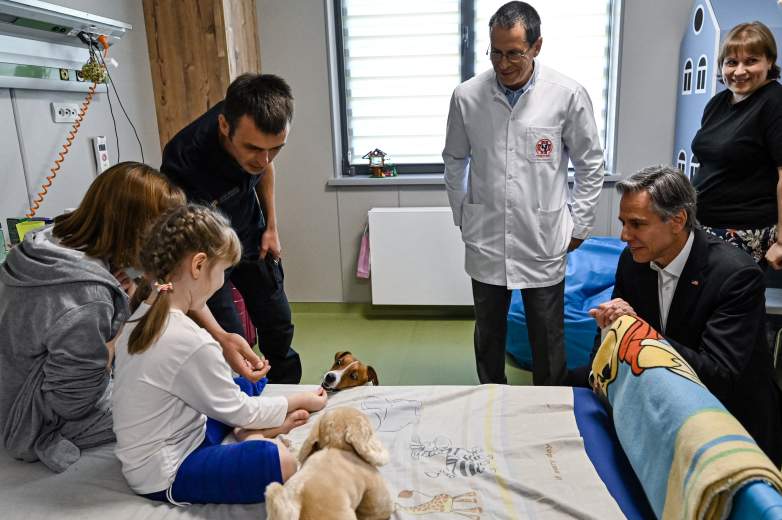
GettyMarina, 6, from Kherson region plays with a landmine sniffer dog, Jack Russell Terrier Patron, during US’ Secretary of State Antony Blinken’s (R) visit to a children’s hospital in Kyiv on September 8, 2022. Blinken made a surprise trip to Kyiv as the United States unveiled nearly $2.7 billion in new military support to Ukraine and neighbors to face Russia.
According to the indictment, Gabrielian and Henry met with the undercover agent at the agent’s hotel room. Gabrielian told the agent, “If you have a useful long-term weapon, that can be used for years. If you use it for something that’s not tactically advantageous, you’ve lost it for nothing. So if (Henry) can’t practice medicine, can’t be in the National Guard, you’ve lost an Army doctor. If I have to look somebody up, and I do look somebody up, you’ve lost a link to (Johns Hopkins) to establish those medical connections. It has to be something massively important, not just check if this person has polyps.”
Gabrielian met with the undercover agent again on August 24, according to the indictment. Gabrielian told the agent that “though Henry was a ‘coward’ and concerned about violating HIPAA by providing records” to the agent, “Gabrielian had no such concerns and violated HIPAA ‘all the time.’ Gabrielian further told the UC she would check with Henry about providing medical records from Fort Bragg patients and get back in touch.”
Gabrielian texted the undercover agent using coded language on August 25, according to the indictment, saying, “Jamie might have samples of his poetry laying around. He says he will look for them and decide if he has the bandwidth for another project over the weekend. I think it would be good for him to at least show you examples of his past work.”
Henry and Gabrielian met with the undercover agent on August 31 at a hotel in Gaithersburg, Maryland, according to the indictment. They gave the agent records related to the spouse of a current Office of Naval Intelligence employee and information related to a veteran of the U.S. Air Force. According to the indictment, Gabrielian “highlighted to the UC a medical issue reflected in the records of” the spouse of the ONI employee, “that Russia could exploit.”
The couple also accessed records for five people, including a retired Army officer, a current Department of Defense employee, the spouse of a U.S. Army veteran, and two spouses of deceased U.S. Army veterans, and gave that info to the undercover agent, according to the indictment.
2. Gabrielian Planned to Send the Couple’s Children to Turkey if They Were At Risk of Getting Caught & Henry Considered Volunteering to Join the Russian Army to Help With the War Effort in Ukraine, Prosecutors Say
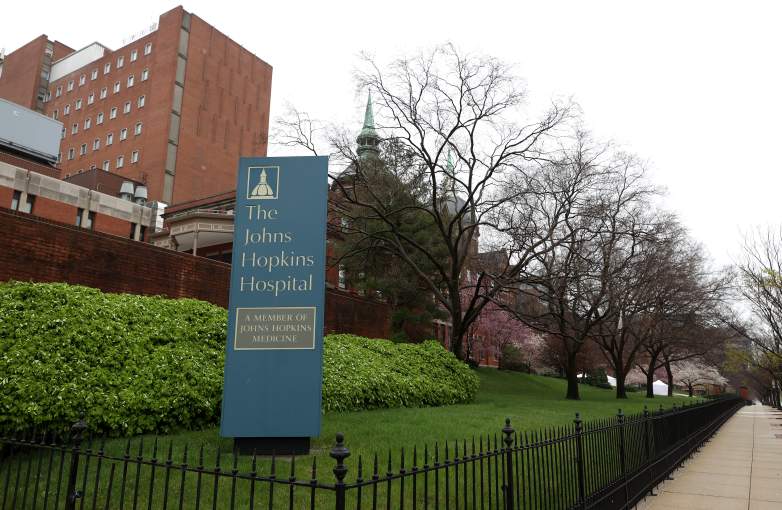
GettyA general view of The Johns Hopkins Hospital on March 28, 2020 in Baltimore, Maryland.
According to the indictment, Henry was “committed to assisting Russia” and “had looked into volunteering to join the Russian Army after the conflict in Ukraine began, but Russia wanted people with ‘combat experience,'” which Henry does not have. Henry told the FBI agent, “the way I view what is going on in Ukraine now, is that the United States is using Uksrainians as a proxy for their own hatred toward Russia.”
Henry told the agent, “My point of view is until the United States actually declares war against Russia, I’m able to help as much as I want. At that point, I’ll have some ethical issues I have to work through,” according to the indictment. Gabrielian said in reply to Henry, “You’ll work through those ethical issues,” the indictment states.
According to the indictment, Gabrielian told the undercover agent if she undertook an action that put her at “significant risk of arrest,” she wanted her and Henry’s children to “have a nice flight to Turkey to go on vacation because I don’t want to end in jail here with my kids being hostages over my head.”
Henry told the agent they had to take precautions so Henry could continue passing background checks for security clearance. Henry told the agent, according to the indictment, “I don’t want to know your name…because I want plausible deniability. In a security clearance situation, they want to know names and people and all this stuff.”
3. Gabrielian Received a Grant in 2020 for a Project Titled ‘Investigation & Optimization of Current Obstetric Anesthesiology Practice in Ukraine,’ Johns Hopkins Says
According to a July 21, 2020, tweet from Johns Hopkins, Gabrielian, “was awarded the Center for Global Health’s Paul S. Lietman Global Health Travel Grant for her project titled ‘Investigation and Optimization of Current Obstetric Anesthesiology Practice in Ukraine.'”
Gabrielian proposed during a meeting with the undercover agent that they concoct a cover story where the agent, whom she thought was a Russian government agent, would be a “delightful medical translator who has reached out to met … and you want to talk with me about programs and how they can be expanded,” the indictment states.
According to the indictment, Henry told the agent that Gabrielian recommended reading the book “Inside the Aquarium: The Making of a Top Soviet Spy.” The 1986 book by Victor Suvorov “describes the recruitment and training of a Russian spy inside the headquarters of the Main Intelligence Directorate of the then-Soviet Union (nicknamed ‘The Aquarium’),” the indictment said. Gabrielian told the agent she told Henry to read the book, “Because it’s the mentality of sacrificing everything…and loyalty in you from day one. That’s not something you walked away from.”
On July 26, Henry tweeted a link to an article from CNN titled, “US approves treatment of wounded Ukrainian soldiers at US military hospital in Germany,” but did not add any commentary. In June, Henry tweeted a link to an article about Russian President Vladimir Putin.
4. Gabrielian, Graduated From the University of Pittsburgh School of Medicine in 2012 & Previously Worked at Allegheny General Hospital & Danbury Hospital
According to her biography on the Johns Hopkins website, Gabrielian graduated from the University of Pittsburgh School of Medicine in 2012. She had a residency in surgery at Danbury Hospital in Connecticut starting in 2014 and a residency in anesthesiology at Allegheny General Hospital in Pennsylvania in 2019, according to the hospital’s website.
She began a fellowship in anesthesia obstetrics at Johns Hopkins University School of Medicine in 2021 and was an instructor of anesthesiology and critical care medicine there, the hospital’s website says. Few other details about Gabrielian’s life and career were immediately available.
On September 9, 2022, Gabrielian gave a presentation on ophthalmic surgery and anesthesia in pregnancy and lactation at the Ophthalmic Anesthesia Society’s annual meeting, according to a program for the event. Gabrielian talked about understanding optimal surgery timing in pregnancy, identifying possible complications and understanding the implications of anesthetics on fetus and lactation, according to the program.
5. Henry Talked in an Interview About Being Outed as Trans by Medical Information
The Department of Justice said in its press release, “During the time of the alleged conspiracy, Henry worked as a staff internist stationed at Fort Bragg, the home of the Army’s XVIII Airborne Corps, headquarters of the United States Army Special Operations Command, and the Womack Army Medical Center.”
Henry was previously married before Gabrielian, according to a 2015 interview with Brightest Young Things. Gabrielian was also previously married and divorced, records show. Henry joined the Army at 17, according to the interview.
“After I became very ill as a result of a bicycle crash in 2008, I felt very vulnerable while being treated as a patient in the same hospital I worked as a physician. What made it worse was that, as a soldier, my medical records were not private, and when the question of mental illness came up, I felt stark naked,” Henry told Brightest Young Things. “When my then wife outed me to a military psychiatrist, I felt violated. Things kind of blew up from there. I experienced very intense gender dysphoria from 2008 until 2014, leading to the breakdown of a number of relationships, leading my entire social network with a few exceptions to shun me for being ‘sexually immoral’. From 2012 to 2014, I underwent depositions and public trials, because I wanted to continue having a meaningful relationship with my son.”
According to BuzzFeed News, Henry joined the ROTC at 17. Henry’s first rotation as a military doctor was in the psych ward at Walter Reed hospital, according to BuzzFeed. Henry came out amid a divorce and child custody battle, according to BuzzFeed. Henry told BuzzFeed, “I find my trans experience has allowed me to relate to people, because all of us suffer, and I could relate to people’s suffering. I’m able to comfort people that feel isolated and lost and alone and broken. I can sit down with them and look them in the eyes, and say, ‘I can walk with you through this. I care about you, and I mean it.'”
Henry said in the interview with Brightest Young Things, “My passion is service member health, which is a big reason I have stayed on with the military despite being given a number of opportunities to separate. The biggest part in supporting the health of service members is listening to them. Trauma has to be handled on an individual’s timeline and in a way that is unique to that individual.”


